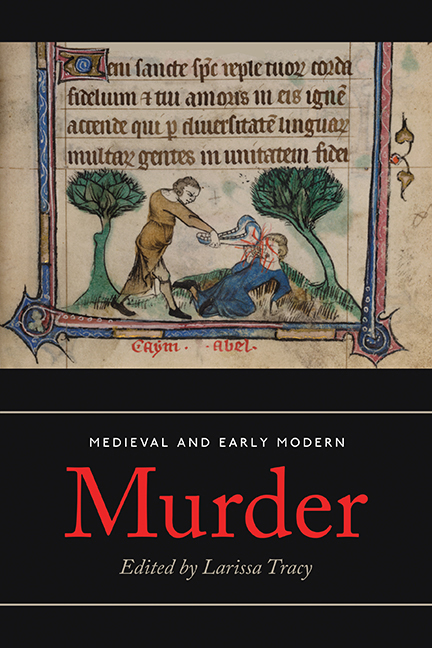Book contents
- Frontmatter
- Contents
- List of Illustrations and Tables
- Acknowledgements
- Contributors
- List of Abbreviations
- Introduction: Murder Most Foul
- I Murder on Trial: Justice, Law and Society
- II The Public Hermeneutics of Murder: Interpretation and Context
- III Murder in the Community: Gender, Youth And Family
- 13 Negotiating Murder in the Historiae of Gregory of Tours
- 14 Poisoning, Killing and Murder in the Edictus Rothari
- 15 Murder, Foul and Fair, in Shota Rustaveli's The Man in the Panther Skin
- 16 A Multiple Poisoning in the City of Valencia: Sanxo Calbó's Crime (1442)
- 17 A Case of Mariticide in Late Medieval France
- 18 Monstrous Un-Making: Maternal Infanticide and Female Agency in Early Modern England
- 19 Imps of Hell: Young People, Murder and the Early English Press
- Conclusion
- Select Bibliography
- Index
18 - Monstrous Un-Making: Maternal Infanticide and Female Agency in Early Modern England
from III - Murder in the Community: Gender, Youth And Family
Published online by Cambridge University Press: 05 July 2018
- Frontmatter
- Contents
- List of Illustrations and Tables
- Acknowledgements
- Contributors
- List of Abbreviations
- Introduction: Murder Most Foul
- I Murder on Trial: Justice, Law and Society
- II The Public Hermeneutics of Murder: Interpretation and Context
- III Murder in the Community: Gender, Youth And Family
- 13 Negotiating Murder in the Historiae of Gregory of Tours
- 14 Poisoning, Killing and Murder in the Edictus Rothari
- 15 Murder, Foul and Fair, in Shota Rustaveli's The Man in the Panther Skin
- 16 A Multiple Poisoning in the City of Valencia: Sanxo Calbó's Crime (1442)
- 17 A Case of Mariticide in Late Medieval France
- 18 Monstrous Un-Making: Maternal Infanticide and Female Agency in Early Modern England
- 19 Imps of Hell: Young People, Murder and the Early English Press
- Conclusion
- Select Bibliography
- Index
Summary
IN THE SPRING OF 1616, Margaret Vincent, a gentlewoman ‘of good parentage … good education … and being careful, as it seemed, of her soul's happiness’ was converted ‘(by the subtle sophistry of some close Papists) … to a blind belief of bewitching heresy’ and became convinced that her family's Protestantism imperiled their eternal salvation. Her husband, Jarvis, rebuffed her pleas for Roman Catholic conversion, accounting such ‘persuasions … vain and frivolous, and she undutiful to make so fond an attempt, many times snubbing her with some few unkind speeches’. This spousal resistance ‘bred in her heart a purpose of more extremity’ until at last she ‘resolved the ruin of her own children … to save their souls (as she vainly thought)’ from being ‘brought up in blindness and darksome errors, hoodwinked (by her husband's instructions) from the true light’. Accordingly, she waited until Jarvis was away and on 9 May – Ascension Day or Holy Thursday – she dismissed her maidservant and ‘like a fierce and bloody Medea’ strangled her two young sons, aged two and five, laying their corpses ‘upon the bed, sleeping in death together’. (The Vincents’ youngest child was ‘abroad at nurse’ and thus survived.)
The anonymous author of the contemporary prose pamphlet, A Pittilesse Mother who most unnaturally at one time murthered two of her own children at Acton within six miles of London, writes that the crime scene ‘might have burst an iron heart asunder and made the very Tiger to relent’ but Vincent – ‘still animated forward by instigation of the Devil’ – instead tried to take her own life, ‘being of this strange opinion, that she herself by this deed had made Saints of her two children in heaven’.
- Type
- Chapter
- Information
- Medieval and Early Modern MurderLegal, Literary and Historical Contexts, pp. 417 - 433Publisher: Boydell & BrewerPrint publication year: 2018



